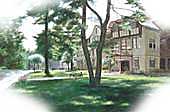Spring
2004
The Beauty of
the Wilderness
Bruce Caisse
“Annas and Caiaphas being the high priests, the word
of God came to John the son of Zachariah in the wilderness.”
Luke 3:2
Annas and Caiaphas, the High Priests, should have received
the word of the Lord. However, the Lord by-passed them, as
He was unable to find a channel within the “church”
of that day, who could hear His voice. Therefore, He used
the wilderness to prepare a voice through whom the first appearing
of the Messiah could be announced.
We often think of the wilderness as a place where we go through
a time of difficulty. It is usually considered to be a place
where the “presence” of the Lord cannot be felt,
or where the “rain” of the Holy Spirit does not
fall, a place of dryness and bareness, both naturally and
spiritually.
Yet, from time to time, the Lord brings us into a wilderness
experience. It becomes a wonderful place when we begin to
understand all that the Lord can accomplish within us during
this time. The wilderness can be defined in one word - “Separation.”
Here, the Lord is able to deal with us concerning all the
ambitions and drives that are within us. In the barrenness
of the wilderness, He is able to take the initiative within
us, and separate us to Himself.
When we view the wilderness as a place of separation “to
the Lord,” we see that it has great value and purpose.
Consider the children of Israel as they were led out of Egypt,
and into the wilderness. There were different levels of separation
in this journey. The most obvious one is the Red Sea. As they
reached the other side, the waters closed upon the Egyptians.
Now, they were to abide under the cloud of glory by day, and
the pillar of fire by night.
However, they began to murmur. This was to have been a time
of preparation, their being made ready to possess the land
that was before them. The pulls of Egypt had been left behind
and they were “closed in,” with the Lord Himself.
This is the purpose of the wilderness. However, Israel failed
to understand this.
“Therefore, behold, I will allure her, and bring her
into the wilderness, and speak comfortably to her. And I will
give her vineyards from there, and the valley of Achor for
a door of hope: and she shall sing there, as in the days of
her youth, and as in the day when she came up out of the land
of Egypt.” Hosea 2:14-15
The Lord is portraying Himself as a husband whose wife has
been unfaithful. She has been distracted by the pull of things
that steal her affections from Jehovah. Yet, the Lord seeks
to restore her and separate her to Himself.
“And I will visit upon her the days of Baalim, wherein
she burned incense to them, and she decked herself with her
earrings and her jewels, and she went after her lovers, and
forgot Me, says the Lord.” Hosea 2:13
This is expressive of the experience that many of us go through,
even after we knew the Lord. We are pulled in other directions.
The Lord’s cure for this is expressed in verse fourteen,
“Therefore, behold, I will allure her, and bring her
into the wilderness, and speak comfortably to her.”
The word “comfortably” means “heart.”
The Lord is saying, “I will speak My heart to her.”
He removed the distractions by taking her away from “Egypt,”
which speaks of the pulls of the world. The purpose of the
Lord in the wilderness is to separate us from “things”
and cause us to know Him and His voice personally and intimately.
The Song of Solomon speaks prophetically of the Bridegroom,
the Lord Jesus Christ, and of His beloved Bride, the Church.
The question is asked,
“Who is this that comes up from the wilderness, leaning
upon her Beloved?” Song of Solomon 8:5a
This trust (leaning) had been developed during a wilderness
experience. Again, we see the purpose of the wilderness: it
provides an atmosphere in which we have no choice except to
begin sharing His heart with us. If we are leaning upon Him,
we can get no closer. John the beloved leaned and laid his
head on the breast of Jesus. Jesus could whisper to John because
of this intimacy that had developed.
The preparation of John the Baptist in the wilderness is
a type of what the Lord is seeking to do within us, during
this present time of transition. The “Word of the Lord”
came to John, and not to Annas and Caiaphas, because John
the Baptist gave himself to a period of separation. He heard
the voice of the Lord alluring him into the wilderness, and
he responded to this time of separation. He left all, that
he might be alone with God. John began to hear the heartbeat
of God as the Lord began to speak His heart to him. We do
not know how long this took, or all that was required of John,
but he was willing to give himself to the Lord.
The spiritual leaders of that day had forsaken the fountain
of living waters, and were drinking from broken cisterns.
Somewhere, they had forsaken the Lord, and broke communion
with Him. The rain had fallen at one time upon the house of
Israel, and they were still drinking from that which spoke
of a former day. They were not ready to hear “a present
word” concerning the coming appearing of the Lamb of
God.
We cannot rest in a past visitation, or word from the Lord.
There must be a continual listening for a present word. Only
then will we be qualified to minister the word of the Lord.
When the Lord begins to rain His blessing upon us, we hold
up our “cup” until it is filled. If we remain
satisfied with this, then five years later, we will still
be saying, “I received this cup of water from the Lord,
would you like a drink?” But five-year-old water does
not taste at all good. However, if we cultivate a link with
the “Fountain of Living Water,” we will have water
that will be fresh each day.
After being in the wilderness, when asked who he was, John
was able to say, “I am the voice of one crying in the
wilderness, Make straight the way of the Lord, as said the
prophet Isaiah” (John 1:23b). While John was alone in
the wilderness, the spark that quickened his heart concerning
the burden of God’s heart grew, until it consumed him
and he became “the voice of one.”
The Lord desires to bring each one of us to the place where
we will be able to hear this cry. We can be content with,
or so busy with the program within the temple, that we do
not hear His alluring call into the wilderness. Annas and
Caiaphas knew the written word of God, but did not hear the
voice of the Lord. John the Baptist probably did not know
the written word as well as they, but he allowed the Lord
to separate him unto Himself so he would be able to hear the
very heartbeat of God.
The Lord is calling those who are willing to be separated
unto Him. The wilderness is not a physical place; rather it
is an attitude of heart.
The Lord is looking for a present day company of “John
the Baptists.” He is not looking for ability; rather
He is looking for “availability.” Each one of
us can be a part of this corporate body that is being prepared
to express the Word of the Lord in our day.


